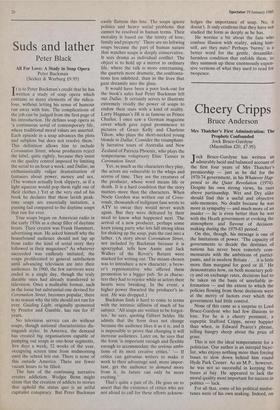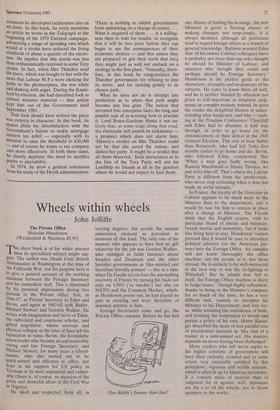Cheery Cripps
Bruce Anderson
Mrs Thatcher's First Adminstration: The Prophets Confounded Jock Bruce-Gardyne (Macmillan £20, £7.95) Tock Bruce-Gardyne has written an J admirably lucid and balanced account of the first four years of Mrs Thatcher's premiership — just as he did for the 1970-74 government, in his Whatever Hap- pened to the Quiet Revolution (1974). Despite his own strong views, he rises above partisanship. Wet and Dry alike should find this a useful and objective aide-memoire. No doubt because he was more in sympathy — and much more of an insider — he is even better than he was with the Heath government at evoking the atmosphere and flavour of decision- making during the 1979-83 period.
On this, though, his message is one of the limitations of power. 'The capacity of governments to decide the destinies of nations has never been remotely com- mensurate with the ambitions of partici- pants, and in modern Britain . . . it is little more than marginal for good or ill.' He demonstrates how, on both monetary poli- cy and on exchange rates, decisions had to be taken on the basis of unreliable in- formation — and the extent to which the policies flowing from those decisions were at the mercy of factors over which the government had little control.
None of this came as a surprise to Lord Bruce-Gardyne who had few illusions to lose. For he is a cheery pessimist, a eupeptic Stafford Cripps, never happier than when, in Edward Pearce's phrase, telling hungry sheep about the price of grass.
This is not the ideal temperament for a politician. Our author is an intrepid bicyc- list, who enjoys nothing more than forcing buses to slow down behind him round Hyde Park Corner. As an M.P., however, he was not so successful in keeping the buses at bay. He appeared to lack the moral quality most important for success in politics — luck.
For all that, some of his political misfor- tunes were of his own making. Indeed, on occasions he developed tactlessness into an art form. In this book, he coyly mentions an article he wrote in the Telegraph at the beginning of the 1979 Election campaign, advocating a range of spending cuts which would at a stroke have reduced the living standards of about a quarter of the electo- rate. He implies that this article was less than enthusiastically received in some Tory circles. In fact, when Mrs Thatcher read the piece, which was bought to her with the news that Labour M.P.s were choking the paths to the photocopiers, she was white and shaking with anger. During the Knuts- ford by-election, she had described Jock as cabinet minister material — that article kept him out of the Government until September 1981.
That Jock should have written the piece was entirely in character. In this book, he makes plain his dissatisfaction with the Government's failure to tackle mortgage interest tax relief — especially with its decision to raise the threshold to £30,000 — and of course he wants to tax company cars more effectively. In both these cases, he clearly deplores the need to sacrifice purity to electability. In 1974, he drew a general conclusion from his study of the Heath administration: 'There is nothing to inhibit governments from embarking on a change of course . . . What is required of them . . . is a willing- ness then to wait for results: to recognise that it will be two years before they can begin to see the consequences of their economic choices — and that unless they are prepared to grit their teeth that long they might just as well not embark on a strategy in the first place.' Naturally, there- fore, in this book he congratulates the Thatcher government for refusing to lose its nerve, and for sticking grimly to its chosen path.
What he does not do is attempt any prediction as to when that path might become any less grim. The nation that invented free enterprise faces the long and painful task of re-learning how to practise it. Lord Bruce-Gardyne thinks it not un- likely that, at some stage along that road, the electorate will punish its taskmaster a prospect which does not alarm him: 'History's verdict on Mrs Thatcher could yet be that she saved the nation, and dished her party. It might be a verdict that all three deserved.' Such insouciance as to the fate of the Tory Party will win his Lordship no friends at all in the quarters where he would not expect to find them.











































 Previous page
Previous page